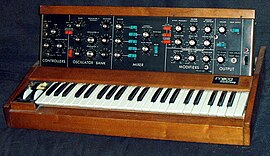Minimoog

The Minimoog is a synthesizer, an electronic musical instrument. This is a compact version of the Moog modular, released in the late 1970s. It overcame the main drawback of the original modular version (which consisted of the size, complexity and weight of the complete system), was compact and resistant, making it could be taken on tour. Also, being smaller, it was cheaper than the Moog Modular. The sound of the Minimoog was characterized by thick character and its warm, silky and vibrant tone.
The designers of the Minimoog, as well as the modular Moog, were Bill Hemsath and Bob Moog, after whom the latter is named.
Like all synthesizers of their era, the Minimoogs were monophonic (only one note played at a time) and did not have memory to store sounds or patches, having to be created or recreated on the spot.
Over the years, the sound of the Minimoog has become a classic comparable to the Hammond organ, the Mellotron or legendary guitars such as the Fender Stratocaster and the Gibson Les Paul.
A final run of synthesizers left the factory in January 1982, after which production ceased.

In 2002, new series with modern additions (MIDI, digital control, memories, etc.) were produced under the name "Minimoog Voyager" until the end of September 2015.
On May 18, 2016, a reissue of the historic Minimoog (model D) was officially announced, with the same features as the original but with a couple of new functions. It went on sale on July 18 of the same year.
Notable recordings
- Love You (1977) by The Beach Boys, Brian Wilson recorded the entire album using the Minimoog.
- From Yes many recordings are remarkable for their use of the Minimoog, such as the albums "Close to the Edge", "Tales from Topographic Oceans", "Going For The One", "Tormato" (with Rick Wakeman), "Relayer" (with Patrick Moraz), and "Drama" (with Geoff Downes).
- Parliament used a Minimoog played by Bernie Worrell in various blows, for "Flash Light" (which created the bass line of this song).
- Gary Numan on his album. Replications (under the name of Tubeway Army) is essentially around the Minimoog. Your next album The Pleasure Principle (1979) and Telekon (1980) also largely function of the instrument.
- Silvio Rodríguez, on the record Nube Rabe (1980), introduces the Minimoog, played by Frank Fernández, in the themes "Imagine" and in the instrumental elbow of "Testamento".
- The Jaivas: on their best known albums, South song (1977) and Altitudes of Machu Picchu (1981), it is the instrument used for the characteristic motif of the famous theme "Go to be born with my brother" and for several solos of songs of the album, as well as songs of the songs of the songs Canción del Sur, Aconcagua and Works by Violeta Parra.
- Charly García in all his times, especially in Sui Generis, The Bird Making Machine and Serú Girán where you can listen to the Minimoog in timbrical records of progressive rock.
- Electric Light Orchestra used the Minimoog synthesizer for some songs from the 1973 album On the Third Day, especially in Daybreaker.
- Pink Floyd, used this instrument in Shine on You Crazy Diamond, using it in the first and third part.
- Kaufman & Silverman used this instrument for the album Plantopia.
Contenido relacionado
Frederic Chopin
Wolfgang Amadeus Mozart
Giuseppe Verdi
Viña del Mar International Song Festival
Cuban music